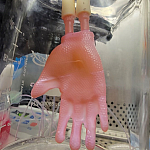You are here
December 21, 2023
2023 NIH Research Highlights - Promising Medical Findings
Results with Potential for Enhancing Human Health
With NIH support, scientists across the United States and around the world conduct wide-ranging research to discover ways to enhance health, lengthen life and reduce illness and disability. Groundbreaking NIH-funded research often receives top scientific honors. In 2023, these honors included two NIH-supported scientists who received Nobel Prizes. Here’s just a small sample of the NIH-supported research accomplishments in 2023. Also see this year's Human Health Advances and Basic Research Insights.
Printer-friendly version of full 2023 NIH Research Highlights
Read more 2023 NIH Research Highlights: Basic Research Insights





